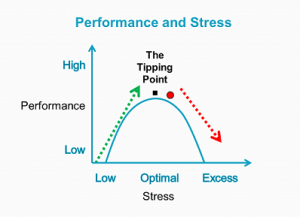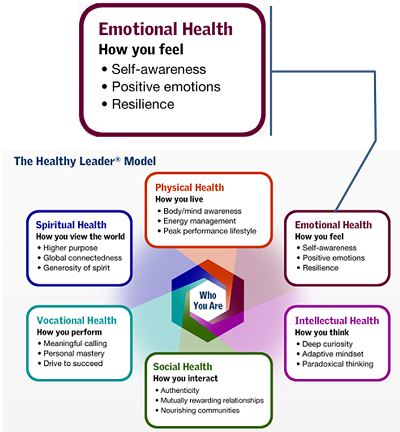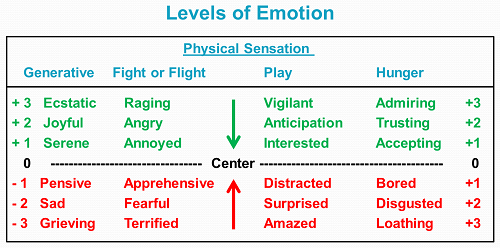When you walk in the room, who shows up for Read more →
The Leader’s Emotional Health
Posted Tuesday, May 7, 2013Allen Slade
Have you ever worked for a toxic leader? Their very presence sets you on edge. Often, a leader’s lack of emotional health is the source of toxic sewage they spew on others. If your toxic leader had been more self-aware, more positive or more resilient to stress, they might not have triggered fear and loathing.
To guard against becoming a toxic leader, examine your own emotional health. In the Healthy Leader® model created by Bob Rosen of Healthy Companies International, the leader’s physical health is just the starting point. Healthy leadership also requires emotional health.
Modified from an image courtesy of Healthy Companies Inc.
Emotional health is not identical to emotional intelligence. That’s good, because emotional intelligence can be dumb. Emotional health is a better way to think about how our emotions influence our leadership.
Self-Awareness
Are you mindful of your own emotions? You should be aware of your emotional state and know the impact of your emotions on your actions. To help coaching clients become more mindful of their emotions, I suggest three steps:
1. Build a vocabulary of emotions. I like Plutchik’s levels of emotions.
2. Notice your emotions by asking “How am I feeling?” on a regular basis.
3. Reflect on your emotions. How do your emotions serve you? What are your emotional triggers? How do you recover from an emotional hijack?
To be mindful, you also need to be open to feedback. If you see feedback as a problem, you will probably not be as self-aware of your emotions. If you shoot the messenger bearing negative feedback, the messengers will stop coming.
How mindful are you of your emotions? If you need to improve your self-awareness, consider getting a leadership coach or an executive coach to help you notice and manage your emotions.
Positive Emotions
In Georgia, my barber always said farewell with “I appreciate you.” Notice he didn’t appreciate my tip or my business. He appreciated me. Was this just a meaningless habit of a gracious Southern gentleman? I don’t know and I don’t care. It made me feel warm.
Bob Rosen has stated that “Human beings are hardwired for positive emotions. . . . Unhealthy experiences and organizations get in the way of their natural expression.” Americans are pragmatic – we identify problems and drive solutions. As a result, we reward managing negative deviance more than leading with appreciation. A focus on problems can cause you to experience negative emotions most of the time. Since you will project your emotions to the people you lead, you could be the source of toxic sewage.
People don’t enjoy toxic leaders. They enjoy working where they are appreciated. Where the focus is on what is good, true, effective and beautiful. Where problems are secondary to opportunities. Where weaknesses are addressed, but strengths are emphasized.
Do you express positive emotions? How much do you express appreciation for the people around you? How about compassion, love, hope or joy? Do you respond to personal offenses with forgiveness?
Or do you live more on the negative side of emotions? Are you known as a fault finder, a problem solver, a cynic? Do your employees dread meetings with you?
Appreciation comes from the inside. You can rewire your emotions to be more positive. Once again, a good leadership coach can help. So can the right barber.
Resilience
When times are tough, resilient leaders are worth their weight in gold. Your ability to lead in storm weather is based in part on your emotional resilience. A resilient leader buffers stress for others.
Emotional resilience is based in part on your ability to get to the center of an emotional storm.  Resilient leaders avoid passing their tipping point of performance, and they manage their own stress to avoid crashing and burning. They know how to create just enough anxiety to drive innovation and change without creating panic.
Resilient leaders avoid passing their tipping point of performance, and they manage their own stress to avoid crashing and burning. They know how to create just enough anxiety to drive innovation and change without creating panic.
How resilient are you? Do you bounce back quickly from setbacks? Are you confident in managing the ups and downs of your organization? Do your employees see you as a stress buffer who helps them through the storm?
Or do setbacks drag you down? Is your confidence only as good as your most recent success or failure? Do your employees see you as a stress amplifier who adds to the drama?
My advice for becoming more resilient is simple, but difficult: Be strong and courageous. There is no easy way to be the leader you should be.
Bottom line: Your emotional health as a leader is based on your self-awareness, your positive emotions and your resilience. How are you doing?




Very interesting. Love the Healthy Leadership Model. So much of the undertanding of emotional health can come from undersstanding basic neurology. I have developed a very easy model for understanding the brain in order to build resilience, which is very powerful. Would love to share it.